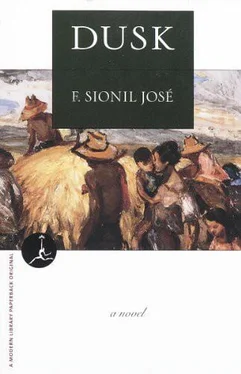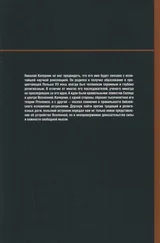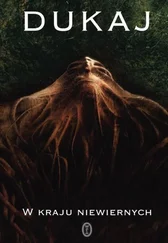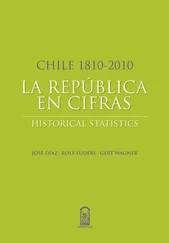She understood. “You are not yet strong,” she said. “There are still many things you cannot do.”
He could feel himself stirring, the blood rushing to the tips of his fingers.
“I am not a virgin anymore,” she said with some sadness.
“You will be my first,” he said.
He kissed her, but she pushed him away tenderly.
He could not leash the animal stirring, he could not stop. His hands groped for her, found her warm and trembling, but she would not let him. “You are not yet strong,” she whispered into his ear as she half rose, looming so close, her face almost touching his. Then she kissed him and he tasted her lips, felt her tongue probe into his mouth.
“Don’t move then,” she told him. “I will do everything for you. And then, when you are strong …”
“You are the first,” Istak said again, then there were no more words.
So this is how two bodies melt into one, a communion, a celebration. This is what he had longed for and would have missed had he entered the seminary. He was a weakling after all, unable to withstand the devil call of the flesh. They were not even married — this was what he was taught, this was what he knew. Yet, within his deepest conscience, this was not wrong. It was bound to be, not temptation, but fate that brought them together, not just her stumbling into Po-on but her going back to the village to take him away from the avid clutch of death. She had given him life, now she was giving herself to him as well.
He slept well afterward, then woke up to the twitter of birds and the scurrying all around him, the boys hitching the carts, the women collecting children, animals, and clothes, getting ready to move. The pots had all been washed and he had slept through it all. He pretended sleep when Dalin went inside the cart and looked at him. The cart started to move, the solid wooden wheels squeaking. The children were talking about the falling star that night. Think of your birthday — and your wish will come true.
The air had a freshness to it; clean and washed, it flowed inside the cart. Dalin’s back was before him and he remembered how he had embraced her, felt the smooth fall of her shoulders, the softness of her breasts.
“Dalin,” he whispered.
She turned to him, her face radiant as morning.
“Thank you,” he said gratefully.
“Are you hungry?”
He nodded.
“There is rice in the pot — it is still warm and the coffee is still hot. There is also a piece of dried meat on top of the rice.”
He rose, squatted behind her, and ate. Occasionally, she turned to him, still holding the bull’s lead, and watched him. They were in the middle of the caravan and his mother was walking up ahead. The grass was wet and the ground was still solid, but in many places mud had already formed and the prints of carabao hooves on the mud were indistinct now. One more caravan like theirs and the road would turn into a quagmire.
He got off the cart when he was through eating and caught up with his mother, who had lifted her skirt to her knees so that it would not be soiled.
He wanted to tell her about Dalin. She must have expected it. Before he could speak, she asked, “How is Dalin?”
“Why do you ask, Inang?”
She turned to him briefly, her face burned by sun and lined by years of work, the eyes sharp and sad at the same time, streaks of white on the hair knotted at her nape.
“She is good,” she said quietly. “This I must say — in spite of all my forebodings. You cannot find a better woman. She works very hard. She has done so much for you at a time when I could not look after you. Your father, he is old and tired and very angry. Do you know what I am trying to say?”
He nodded slowly.
“Dalin is good for you. Take care of her,” his mother said, “and she will reward you.”
It rained every afternoon and they stopped in the villages until the rain passed. Ba-ac was often seized by fits of anger, and as if he were mad, he would shout his curses to the wind: Cunts of your mothers, you are evil like lightning. What have I done to you? Why are you doing this to us? You will have your time, you will pay! And not just with your blood. We will chop you bit by bit, your balls and your penises, we will throw them to the dogs. Cunts of your mothers!
Mayang did not stop his ranting anymore. She would just wait until he quieted down, his breathing heavy and tired, his eyes wet with tears. Seeing him like this, Mayang often cried. The children were too young to understand, but the other farmers and their wives understood. They were silent, for the old man’s anger was also theirs; he was just giving shape to the emotions that flamed in their hearts but could not burst out — neither words nor deeds nor yet light in their minds to show them how they could truly be themselves and not be hounded — helpless creatures that they were.
There were more towns now and every time they approached one, they would circle away from it. An-no, Bit-tik, or their uncles and the older boys walked ahead of the caravan. The road had become muddier as the days lengthened into a week.
Then, one morning, the Guardia came upon them — eight mounted soldiers with a Spanish officer, their rifles slung on their shoulders. They descended upon them from the rear so quickly they seemed to have appeared like phantoms from the grass. The men were brown like them, except for their officer.
Ba-ac, who was in the lead cart, happened to be asleep; he had stood guard the night before and was about to rise at the shout of “¡Alto! ¡Alto!” but Mayang quickly pushed him back and covered him with a blanket.
Istak was holding the leash of the bull out front when the Spanish officer rode past him and, briefly, their eyes locked. Capitán Gualberto did not recognize Istak, although Istak knew him at once. Who could miss his short-cropped hair, that aquiline nose, and those eyes that seemed to burn with perpetual hate? But Istak was no longer the acolyte who had served him in the kumbento in Cabugaw; he was now emaciated and pale as if he had just been snatched from the grave.
The Guardia had apparently been riding for some time; their blue uniforms were dirty and their horses were panting and wet with sweat. In his heavily accented Ilokano, Capitán Gualberto asked Blas, who was nearest to him, where they came from. Ba-ac’s cousin meekly told the truth, “Candon.”
And where were they going? “To the valley.”
“Your cédula , your cédula ,” the Spanish officer barked.
From the wall of the cart, Blas took a small pouch and within was a piece of paper carefully wrapped with cloth; he presented it with trembling hands to the Spaniard, who glanced at it, then handed it back.
Istak felt his chest caving in, his knees giving out. Now the officer would ask for the cédulas of the others, now they would be found out and most probably killed right there.
But Capitán Gualberto did no such thing; one cédula seemed enough. He ordered them to dismount — all of them — and when they had dismounted, he rode to each cart and peered within. At the lead cart, he paused briefly to look at Ba-ac covered with a rough blanket, the face haggard, the eyes closed in sleep. “He is very ill,” Mayang, who stood by, told him.
Not one of the Guardia had dismounted; they formed a line beside the caravan while Capitán Gualberto continued his inspection. There was nothing of value in the carts, just the usual provisions of poor farmers, until his eyes rested on Blas’s two girls, first at the younger, then the older; his eyes widened and a grin crossed his face.
He asked Orang to step out of the line, and when she did, he looked at her again, her youth, her good limbs. The soldiers knew what to expect next and they were laughing boisterously. Blas was now livid with fear and anger, but a soldier drew a gun on him. His wife started to cry, and so did the younger sister. An-no, who stood by, knew what was going to happen, too, and though the darkest thoughts rushed to his mind, if he as much as moved a hand he would be shot, as Istak had been.
Читать дальше












